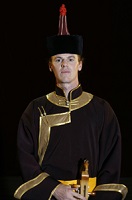Tuvan music in schools in the United States
DOI:
https://doi.org/10.25178/nit.2017.2.10Keywords:
Tuva; Tuvan music; Alash; concert tours; throat singing; school; USA; xöömei; musical anthropologyAbstract
The essay sums up the author’s reflections in the field of musical anthropology, with the focus on how ethnic music is understood by listeners with a different cultural background.
The author was born and grew up in the USA. He graduated from Macalester College in Saint Paul, MN with a bachelor’s degree in music and classical languages. On a Fulbright grant, in 2003 he first came to Tuva to study Tuvan throat singing, culture and language. He took classes from many famous xöömeiji of Tuva. During his subsequent visits, the author improved his command of the xöömei (as well as the Tuvan language, which he speaks fluently) and worked in the National Orchestra of Tuva. In 2008 he was awarded the title of People’s Artist of Tuva. Since 2015, he has worked at the Center for the Tuvan Traditional Arts and Crafts, while continuing to perform with the National Orchestra of Tuva.
Since 2006, he has also worked with Alash, a Tuvan folklore music band. As their manager, producer, sound engineer and translator, the author organized a number of tours around the world, visiting many countries. He also produced their three studio albums.
A number of concerts took place at US educational institutions (schools and colleges). In this article, the author focuses on the reactions from people who for the first time in their lives had heard Tuvan music with the astounding effect it usually has on its audience. His observations in anthropology are of significant interest for such fields as musical studies, cultural anthropology, psychology, cultural studies, etc.
Published
How to Cite
Issue
Section

Author(s) license holder(s) grant rights for their work to the journal (grantee of a license) under the simple non-exclusive open license in accordance with Art. 1286.1 «Open license for a research work, work of literature or fine arts», Civil Code of the Russian Federation.
New Research of Tuva publishes articles under the Creative Commons Attribution-NonCommercial license (CC BY-NC).
Since it is an open license, author(s) reserve the right to upload the article to their institutional repository, submit it to another journal (if it allows republications), or republish it on their own website (in full, or in part).
However, several conditions apply here:
a) The republished version must always contain the name(s) and affiliation(s) of the author(s), the original title and the hyperlink to the original version on the New Research of Tuva website;
b) It must be in open access, free of charge, and no category of readers must be in any way whatsoever advantaged over general readership.
c) should the contribution be submitted elsewhere by its author(s) without substantial modification (30% or more of original text unchanged), the body of the article should contain a disclaimer that the original version was published in New Research of Tuva (with a link to the respective page)
The CC-BY-NC is a non-revocable license which applies worldwide and lasts for the duration of the work’s copyright.









